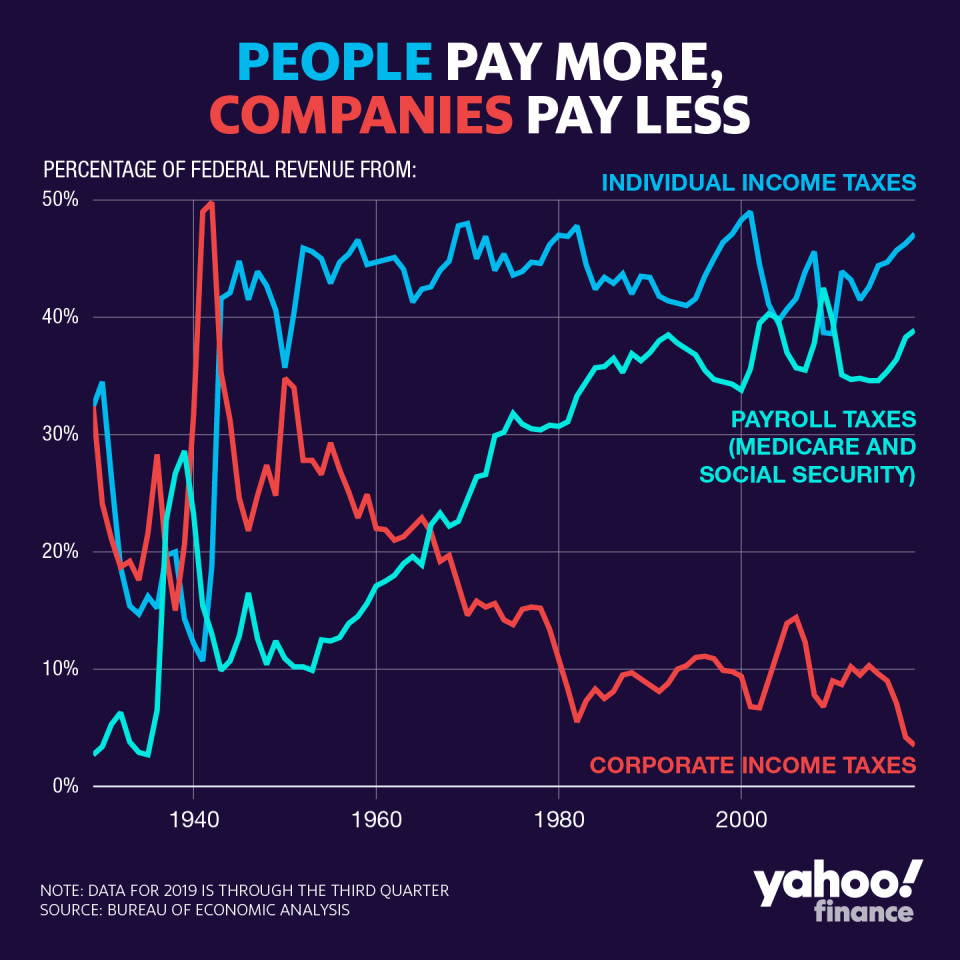Business tax payments will hit a record low this year
Businesses were once a meaningful source of taxpayer revenue. Not anymore.
Business taxes in 2019 are on track to be the lowest portion of federal revenue on record, in data that goes back to 1929. That’s contributing to annual deficits likely to top $1 trillion in coming years—and fueling calls among Democratic presidential candidates to revamp the way businesses pay taxes.

Through the third quarter of 2019, corporate taxes accounted for just 3.5% of all federal tax revenue, according to the Bureau of Economic Analysis. That’s a sharp drop from earlier decades. Corporate taxes accounted for 9% of federal revenue in 2010, 9.4% in 2000 and 22% in 1960.
The portion of federal taxes paid by individuals has drifted higher over the decades, from 44.7% in 1960 to 47.1% this year. The biggest rise in taxation has been payroll taxes used to finance Medicare and Social Security. Those have risen from 17.1% of federal revenue in 1960 to 38.9% today.
The Trump tax cuts, which went into effect in 2018, have pushed business taxes to record lows—and many big companies now pay no federal income tax. The Institute on Taxation and Economic Policy found recently that 91 Fortune 500 companies paid 0 income tax in 2018, even though they turned a profit. That’s possible because of more than two dozen tax breaks that allow companies to legally lower their tax bills and in some cases eliminate them altogether.

Among the companies paying no federal income tax in 2018: Amazon (with a profit of $10.8 billion), Delta Air Lines ($5.1 billion in profit), Starbucks ($4.7 billion in profit), Chevron ($4.5 billion in profit) and General Motors ($4.3 billion in profit). Those companies do pay federal payroll taxes, which fund Social Security and Medicare and are split between employers and workers. And they may pay state and local income taxes.
Corporate contributions on the decline
While the Trump tax cuts have pushed business taxes to new lows, the corporate contribution to federal revenue has been declining for decades, for a variety of reasons. One is the corporate tax rate, which Congress has cut several times over the years. In the 1970s, the top corporate rate was 48%. It was 35% from 1994 through 2017. Then in 2017, Trump signed the new law cutting the top rate to 21%. While some think that’s too low, many other developed nations have been cutting corporate rates, to lure multinational businesses. At 35%, the U.S. rate was one of the highest in the industrialized world, creating an incentive for U.S. firms to move business offshore.
Globalization and digital technology have made it much easier for big companies to move business around and take advantage of countries offering the lowest rates. The many loopholes in the U.S. tax code are supposed to strengthen the incentive for American firms to spend and invest in the United States. But they further lower the federal tax haul from businesses. A provision allowing accelerated depreciation of equipment businesses purchase costs $68 billion in foregone revenue per year, for instance. And the Congressional Budget Office estimates that a one-percentage-point drop in the corporate rate costs Uncle Sam about $10 billion per year.
Democratic presidential candidates want to reverse the trend and force businesses to pay more in taxes, to fund various health and social programs. Sen. Elizabeth Warren wants big companies to pay a 7% surtax on all income above $100 million. Former Vice President Joe Biden would require profitable companies to compute an alternative “book tax” and pay that if it’s higher than their tax bill calculated by the usual methods.
South Bend, Ind., Mayor Pete Buttigieg wants to raise the top corporate rate back to 35%. And Sen. Bernie Sanders would link each company’s tax rate to the ratio by which the CEO’s salary exceeds median pay at the company.
American businesses can afford to pay more, but it’s also true that the wrong kind of corporate tax hikes could depress business spending and hiring. A more effective way to raise revenue might be higher taxes on capital gains, which are often related to business profits. Revenue experts at the Congressional Budget Office have dozens of other ideas, including a value-added tax like most other countries have. With those massive trillion-dollar deficits, somebody’s going to have to pay more, eventually.
Rick Newman is the author of four books, including “Rebounders: How Winners Pivot from Setback to Success.” Follow him on Twitter: @rickjnewman. Confidential tip line: [email protected]. Encrypted communication available. Click here to get Rick’s stories by email.
Read more:
Read the latest financial and business news from Yahoo Finance
Follow Yahoo Finance on Twitter, Facebook, Instagram, Flipboard, SmartNews, LinkedIn, YouTube, and reddit.
